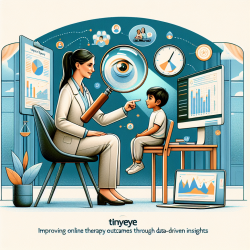Introduction
As a practitioner in the field of speech-language pathology, making data-driven decisions is crucial to improving therapy outcomes, especially for children. Recent research has provided insights that can be applied to enhance the effectiveness of online therapy services, such as those offered by TinyEYE. By understanding the life-stage and contextual factors that influence decision-making and planning, practitioners can better tailor their approaches to meet the needs of their clients.
Understanding the Research
The study titled "Life-Stage and Contextual Factors of Advance Care Planning Among Older Adults With Limited Income" explores how various factors impact decision-making processes. Although the study focuses on advance care planning among older adults, the insights gained can be applied to other areas, including online therapy for children. The research identifies four key themes:
- Structural factors
- Life-stage influences
- Social stressors and resources
- Individual stress responses and readiness
By understanding these themes, practitioners can develop more effective strategies to engage clients and improve therapy outcomes.
Applying the Insights to Online Therapy
Practitioners can leverage the findings from this research to enhance their online therapy services in several ways:
- Personalized Approaches: Tailor therapy sessions to address the specific life-stage and contextual factors affecting each child. This personalization can help in creating a more engaging and effective therapy experience.
- Building Trust and Support: Establish a strong support system for children and their families. By understanding the social stressors and resources available, practitioners can better support families in navigating therapy challenges.
- Enhancing Communication: Encourage open communication between therapists, children, and their families. This can be achieved by addressing individual stress responses and readiness, ensuring that all parties are comfortable and prepared for therapy sessions.
- Continuous Learning: Stay informed about the latest research and trends in speech-language pathology. By continuously learning and adapting, practitioners can implement evidence-based practices that lead to better outcomes.
Encouraging Further Research
While the insights from the study provide a strong foundation for improving online therapy services, there is always room for further research. Practitioners are encouraged to explore additional studies and data to continuously refine their approaches. By staying engaged with the latest research, practitioners can ensure they are providing the highest quality of care to their clients.
Conclusion
By applying the insights from the research on life-stage and contextual factors, practitioners can enhance their online therapy services and improve outcomes for children. Understanding the unique needs of each client and continuously adapting to new information is key to success in the field of speech-language pathology.
To read the original research paper, please follow this link: Life-Stage and Contextual Factors of Advance Care Planning Among Older Adults With Limited Income.










